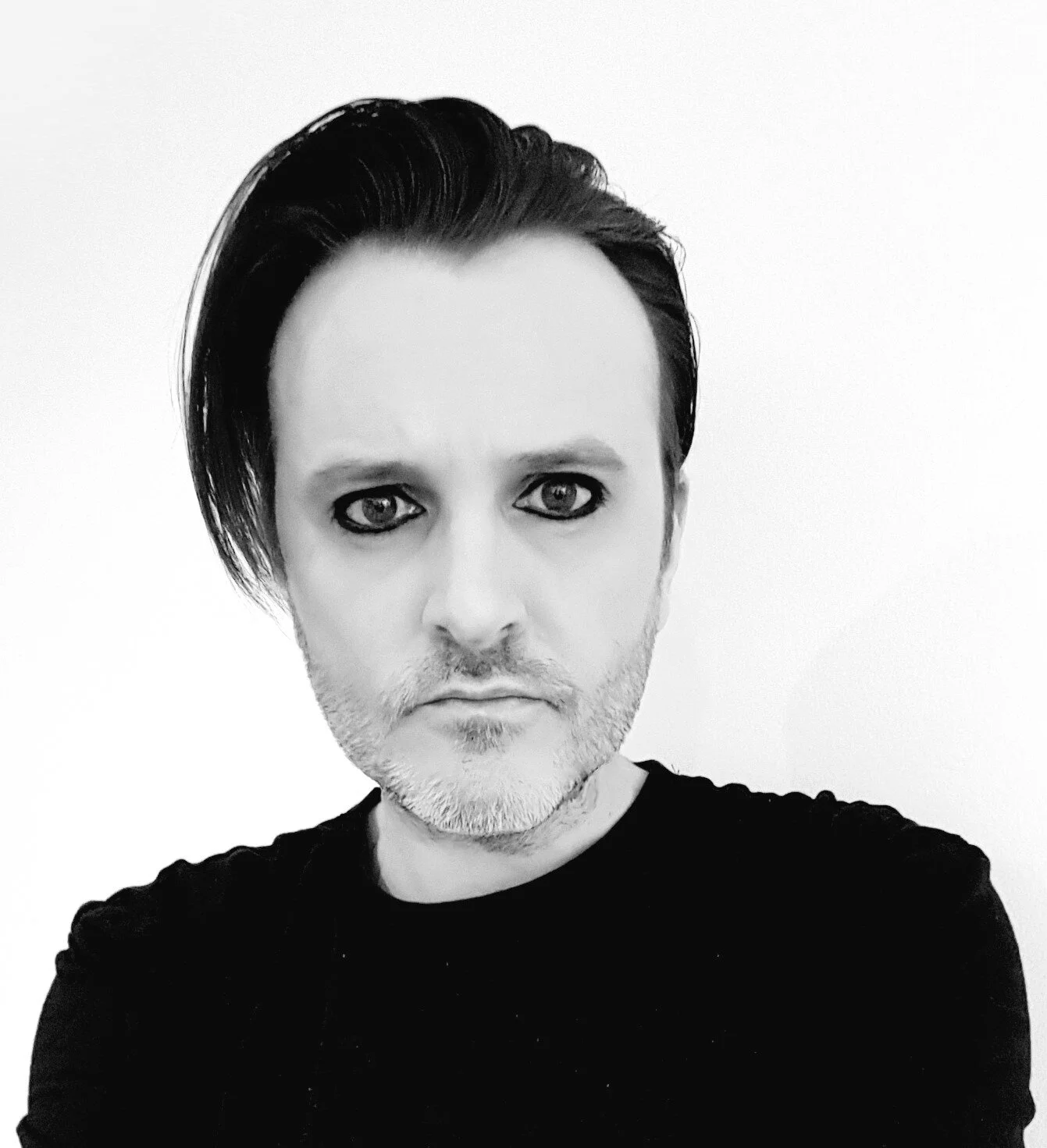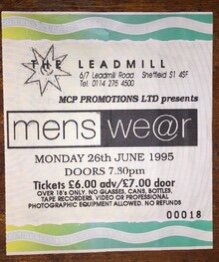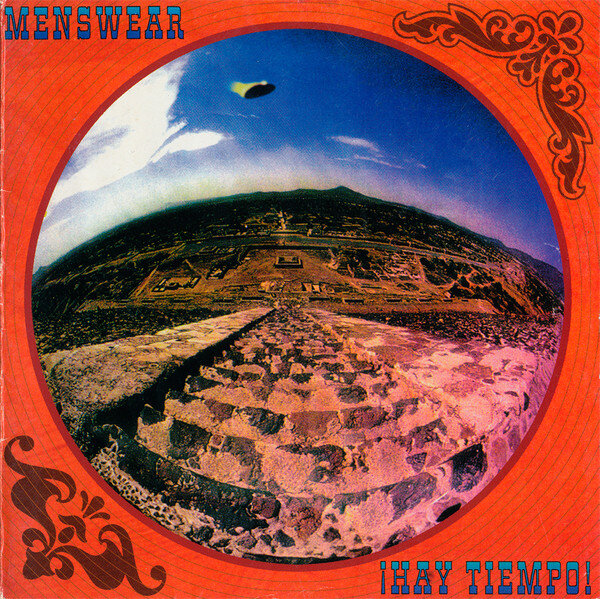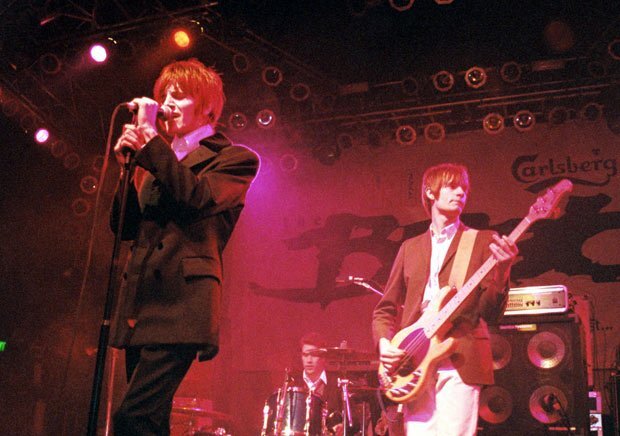MENSWE@R
It was some kind of magic to be young in 1995. I was fifteen. I was a few years into an obsession with indie rock. Now the music I liked was in the charts, on the telly, on the radio… and I was old enough - with just about enough facial hair - to see it live. This was an age where the most pressing worry in my life was who was better, Blur or Oasis. The answer is of course, Pulp. Somewhere in and around all this was Menswe@r.
Out at the front was singer Johnny Dean, the focal point of a band who were as notorious as they were tuneful. They came, they blagged, they wrote more good songs than they were ever given credit for. Now they’re arrived at the pearly gates of ‘Indie Heaven’. There’s is a helluva story. Who better to tell it than Johnny…
If you enjoy this interview, please consider a donation to the National Autistic Society. And why not check out Johnny’s interview with me for The OCD Chronicles?
I won’t go over the band’s origins in too much detail - Dave Simpson did that really well in The Guardian recently - but I’ve always wanted to know more about Smashing, the club night Menswe@r frequented. I never attended - I was fourteen and living in Yorkshire - but I read about it and it sounded like the most exciting place in the world. What was it actually like?
“Clubs were Menswe@r’s launch pad. We were born in clubs. I think a lot of bands are. Blitz was responsible for a fair few bands in the 80’s wasn’t it? I’d say Smashing was the Blitz Club of the nineties. I’ll always remember it as this very glamorous, very leftfield space where you could be who you wanted to be. The music was very eclectic, you could hear anything at Smashing, anything that had been recorded in the previous four decades. All genres. No rules. It was quite an inspirational place. It was exciting. And for me it was the clientele who made it really special. I met so many amazing people there, from Leigh Bowery to Todd Haynes. And of course anyone who was anyone in what became Britpop went there at some point. I have very fond memories of Smashing. I’m honoured to have been a part of it all.”
Something I didn't realise for years and years is that you and Chris [Gentry, guitar] are in Pulp's 'Do You Remember The First Time?' video. What do you remember about that?
“A few things have stuck in my mind from that day. It was filmed on the Thamesmead estate, and the residents were fiercely protective of it. Clockwork Orange was filmed there, and because of that it had attained a certain reputation, unfairly. So every now and then the film crew would be approached by concerned residents asking what they were up to. “Don’t you make our home look bad…” That kind of thing. The other thing I remember really clearly is Jarvis [Cocker, Pulp singer] showing me how to mend a snapped cigarette so it could be smoked. That’s years on the dole for you. Oh, and for the whole day people kept telling me and Chris to form a band. Careful what you wish for folks...”
Where did Menswe@r get their suits tailored? They were sharp!
“We each had a suit tailored by Mark Powell as part of our record deal. If you type ‘Mod Taylor London’ into Google his name comes up first. The other guys stopped wearing suits fairly quickly, which I always thought was a shame. I had a few suits made but not for touring. Suits get ruined on tour really quickly, so I would just wear off the peg stuff from one-stop-Mod-shop Merc. You wouldn’t feel so guilty about them getting ruined.”
What do you remember about the first Top Of The Tops appearance in early 1995?
“It was very exciting. It was a personal ambition to be on Top Of The Pops, so to be on it - and make history as the first band to appear without having released a note - was a real bucket list thing with bells on. Gay Dad have tried to steal this honour, but it was Menswe@r that did it first! I just remember that I was keen to make an impression and this might be my only chance, so at the end of one of the takes I threw my mic stand into the audience. That was the one they used. The BBC received something like 1500 complaints over it, the most that week. Mission accomplished. And I also remember Courtney Love turning the air blue after Ant and Dec introduced her as Kurt Cobain’s widow. That actually happened. They had to rewrite that bit. They shit themselves.”
Perhaps more importantly, where did you get that jacket from?
“The guardsmans jacket was from Camden. This guy used to sell them just outside where the old MTV building was. He gave me a discount. Not long after he was stabbed to death. I still have it actually. I won’t part with it. No, it doesn’t fit anymore.”
There was, to use a cliche, a signing frenzy to obtain Menswe@rs signature. Why did you end up with London Records?
“We had whittled our suitors down to two companies. Blanco Y Negro, who were part of Warners, and Laurel who were part of London. They flew us to New York for a weekend, one paying for flights and the other taking care of hotel bills. We met with Danny Goldberg who was head of Warner’s at the time and he did the whole “call me anytime” routine. Afterwards we went to a pizzeria with Geoff Travis, who ran Blanco. Basically he didn’t pay for the bill, and we were a little put out. Then later we tried to call Goldberg and his secretary wouldn’t put us through. I was leaning towards Blanco up to that point. It’s silly really, and actually something I regret. Also the guy from Laurel literally begged us. It was not pretty. I caved in to stop him. If I could do it again I’d go with Blanco. Nothing against London, but they were very much a pop label at that point. Our relationship became strained quite quickly.”
How important was Graham Coxon to the Menswe@r story? I spent my entire teenage years pretending to be Graham Coxon. Or, is the idea he was romantic Britpop folly?
“Well, we knew him. He was a mate. And I think he was vaguely aware of what we were doing band wise? But I don’t think he expected it to come to anything? I think Blur were quite important, as an influence, and Graham is very important in that respect. But we weren’t asking him to get us a deal. We all moved in the same circles.”
What do you remember about being profiled early on by Caitlin Moran in the Melody Maker? I'm always interested in how something my end - as a teenage reader - which felt so exciting and anathema to the humdrum of my then life, played out in actuality for the subject matter...
“Is this the infamous centre spread in the infamous New Mod issue? Yeah, it was exciting because it was our first major piece, but also we were very wary of being lumped into this thing we didn’t feel part of. That I wasn’t convinced was an actual thing. Yes we went to Blow Up. Yeah, we wore suits. But that’s as far as it went, Mod wise. This is when the press were still trying to find something that they’d eventually consolidate under the Britpop banner. Actually, real Mods were horrified by us. Paul Weller was very disparaging about Simon [White, guitarist]’s shoes.”
I think Menswe@r are a) a classic rock 'n roll caper, b) a cautionary tale, c) a missed opportunity - lots of things. And it was brief; album one, Nuisance, came out 1995. Two years later you’d split up. Can you recognise the high point within it all?
“For me the high point was the first couple of UK tours we did. I’d been to quite a number of gigs as a punter but none of them felt like these gigs. It really was something else. Menswe@rmania! I’d never been to a gig where there was just this constant wall of screaming throughout. And the venues were rammed. We always sold out, but those gigs seemed dangerously packed. Just a screeching mass of limbs and eyeliner and Adidas. Nothing compares to that. And we were so up for it. Tremendous.”
What about the low point?
“After that it was just a slow decline, not in audience numbers, but in our attitude and decision making. The bigger the venues got the less it made sense. To me anyway. I think as a band we began to fall apart as soon as we signed a contract. The lowest point would be the sacking of our drummer Matt [Everitt]. I love Matt. But it felt like the decision had been made before I was even aware of a problem. It seems so unnecessary now. That was definitely the point where the wheels fell off.”
The Select cover in late 1996 - the 'indie Take That' thing. Having been a music journalist so long, I get the spin. Did you feel like that's how you'd been marketed though?
“Thing is, I’d been pushing the Take That angle before that Select article. Not as a marketing thing. It was a reaction towards many of my contemporaries harping on about “proper music”, thinking they were more than just pop bands. You know, bands that got in the music charts? I’m really sorry guys, but The Beatles were a pop band. There is nothing wrong with being pop. Pop is what it’s all about. Pop is exciting and vital and important. I’m not someone who judges people because of their musical tastes. I think it’s ridiculous. And immature. And entirely pointless.”
So, album two. For years, the only way a Brit could hear ¡Hay Tiempo! - which was only released in Japan and until recently not in the UK - was on the jukebox of The Good Mixer in Camden. Did you know this?
“I did know this. Simon gave it to them.”
That album marked the end of the band. What's more important to the creation of it? Cocaine, the U.S. tour with The Charlatans - there's a lot of organ going on there! - or a subconscious desire to destroy everything and get the hell out of dodge?
“All of those things. But I think also that Simon had this great desire to be accepted by his contemporaries? I think he’d agree with that now. That album is very much his baby. There was this strong desire to distance ourselves from Nuisance. By this time I had withdrawn. I wrote some lyrics, some melodies, came up with the album title but I was on autopilot. Just waiting for the inevitable. There was no way London was going to go along with it. It was a slow and painful exercise in shooting yourself in the foot. It’s not a bad album, I just think we had other stuff at that point that would have made it better, and more palatable. But at this point we weren’t really a band anymore.”
I always thought that the band's songwriting was at its best when it was at its most soppy and introverted. I'm thinking 'Being Brave' and 'The One', but also the unreleased stuff like 'Is This the Way?' I'm presuming the way the band came to be, the hype, the packaging, meant that this stuff wasn't allowed to be explored as much as you might have liked?
“Hold tight people! I’m not keen on ‘Being Brave’. I know! Madness! It’s one of the songs I least enjoy when playing live. Don’t tell the rest of the band. ‘The One’ though, yeah that’s a good one. I don’t think this is something I’ve thought about to be honest? I’m more concerned about whether the song is just… good? No one really told us what kind of songs we should be writing. Other than the one time the record company told us to ‘write some singles’. That went down well.”
Okay, hot-take - the songs on the rarities section of the new box set - specifically the ¡Hay Tiempo! sessions stuff - could have easily have been fashioned into a second album that was a bridge from Nuisance to where you might have wanted to go next, and thus not as much as a sharp right turn from where you'd been. Hindsight is a wonderful thing, eh?
“I absolutely agree. But as I’ve covered here, there were factors at play that prevented that from happening. As a band we were treading water and nobody wanted to rock the boat in case it sank. It had already sunk. I knew that. I’m sure the others knew as well on some level.”
When the band ends, you vanish from the public eye for years. Where’d you go?
“I tried to be ‘normal’, but it didn’t work out too well. There are lots of rumours about what I did. Because I did disappear completely for a bit, I no longer dictated the dialogue and it was left to other people to spin tales about me. I’m okay with that though. But just because you’ve heard something about me doesn’t make it the truth. Mmmkay?”
Okay. But what is the truth?
“What really happened is that at some point I was diagnosed as being on the autistic spectrum, and as having OCD, as well as a pretty serious dose of depression. The autism diagnosis actually helped enormously because it helped me to understand myself a bit more. Most people spend most of their lives not knowing who they are. So I’m grateful. I’ve done some music things, bits and bobs. But not all of it was positive, so I’m really careful now. People have motives, y’know? And being autistic I need transparency. It’s funny how people don’t get that. It’s also funny that no matter how many people I tell, some people still don’t want to give me a break. But I guess that’s their baggage, innit?”
As an OCD sufferer myself, I can relate. OCD and Autism are often bedfellows. People never really forgot about you though. The Art Brut song about you, the late, great Nuisance club night in Camden - when you're away there's a groundswell of love for you and Menswe@r. How did that feel? Flattering? Strange? All of the above?
“I’m pretty much unaffected by it to be totally honest. I’m not ungrateful. It just isn’t something I really think about? I really don’t think of myself as a pop star. Or an ex-pop star. I try to be present in the moment, if that makes sense? What people think about me is none of my business.”
Can you tell me more about your Autism diagnosis? I read you say that for many years you ‘didn't feel like you belonged on the planet...' I've often, through the filter of OCD, felt similar. It helps knowing what's wrong, right? Having the language to use?
“It’s something I had suspected for a long while, that I was autistic, but I didn’t know what to do. At this time it was still something that wasn’t really fully understood within the medical community, let alone Joe Public. The short story is that after years of forcing myself to fit in, or ‘masking’, I finally just cracked. Much worse than just a meltdown, I was practically comatose and I ended up in a psych ward. That is when I made the decision to do something about it, even if it killed me. And I did. I think it was well worth it. I now have far more awareness in regards to how my circuitry works, how I’m wired. I’d recommend seeking a diagnosis if you’re an adult who suspects you are autistic. I understand not everyone wants to. I guess the fear is ‘what if I’m not actually autistic?’. But at least you’ll maybe find out what is going on? And that’s comforting in my opinion. Also getting a diagnosis helps with statistics, which ultimately helps with funding. So my advice is take courage, sometimes being brave is exactly what’s needed.”
One of the things that doing 'Indie Heaven' has taught me, is that few made it out of Britpop without that time really, really messing with their heads. I'm sure the answer is 'drugs', but why do you think that is? I should say that I know Britpop was a very silly, reductive term, but to me, living in the middle of nowhere, pre-internet, it was an absolute lifeline...
“Britpop happened because the record labels were loaded in the 90’s. There was so much money being made from CD remasters and so on. When what used to be called indie, or alternative, started to make waves in the charts, all these small labels got swallowed up by the majors. Nothing corrupts quite like money. So you had all these kids in little bands suddenly being chauffeured around like U2 and existing on the Rick James diet, with absolutely no safety net. When the labels realised they had spent too much on something that ultimately didn’t even outsell dance records at the time they pulled the plug and walked away. There’s no duty of care in the music business, so all these kids were left to figure stuff out for themselves. It was like the hangover from hell for a lot of people. I’m sure The Priory did very well out of Britpop…”
Here’s some random questions. In 2012, cheeky Chris Gentry pranks the world in announcing that Nuisance has gone platinum. How was that for you?
“I thought it was funny at first. But then it became unfunny because some people used it as an opportunity to attack me. Which says more about them than it does about me.”
Stuart [Black, bassist]. Where is he now?
“I'm not totally sure what Stuart's doing now. I think he took over his dad's building business and moved out of London. He's happily married with a little boy, so he's settled. And he's returned to his first love, the trumpet. Playing in a brass band. I think that's how he met his wife.”
I'm not sure I've ever heard anything more mid-nineties than that Student Union remix of 'Daydreamer' that’s in the new boxset! Tell me everything you can about that!
“It was the brainchild of Martin Green and Michael Murphy, the DJ’s at Smashing. They wanted to remix ‘Daydreamer’ but pretty much reworked it into something else. They asked me if I’d be up for recording new vocals that would fit. And I was. I’m quite fond of it. It’s more Numanesque than our Wire version. It was put out as a white label. There aren’t many out there, so if you love Menswe@r you need to get on eBay!”
I’m gonna be honest, even as a fan, I never thought I'd hear the phrase 'Menswe@r box set'!
“You and me both pal! Like most things when it comes to Menswe@r, it was down to chance I guess. A nice man called Ben Stanley from Demon Records contacted me as he had licensed Nuisance with a view to releasing a special 25th anniversary edition for Record Store Day. He wanted to get my blessing I think. So we set up a meeting and I mentioned the second album, how it was only ever released in Japan, and also all that other stuff we recorded during this period. I wondered if he was interested. Ben will admit he is a big ‘Swe@r fanboy, and I’m fairly sure he had to contain himself at that point. He kept his cool admirably though... And that’s how the ball started rolling. Chris was able to contact London and miraculously they had kept everything. All this stuff I thought was lost forever. There was so much material it just made sense to do a boxset. On the whole people have been very generous about it. It’s not Smile or Sgt. Peppers but I think it’s worth your time if you like 90’s indie. Even if you claim to hate us. Some of it is pretty good, I think.”
Tell me what the future for Johnny Dean looks like from where you’re standing…
“So with Menswe@r there's the boxset, which contains pretty much everything we did over four CD’s, including the second album. There's also now a vinyl edition of ¡Hay Tiempo! out there. I still make music but it's about feeding a compulsion I have to do so rather than going out and touring it or hoping people dig it. As for the future, my health has not been good for the past decade or so. Right now I'm concentrating on getting well and I have about 18 months left on a medical trial I'm taking part in. Once that's done, touch wood, I'll be well enough to get on with some more stuff. By that point I'll be 50-years young, so let's see? I have a lot of ideas. I always have ideas. But one step at a time…”










